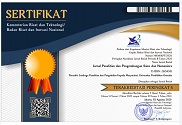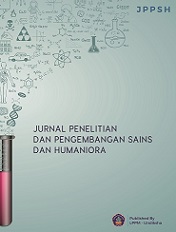The Effect of Entrepreneurial Orientation on Market Share of Consumer Goods Manufacturing Companies in Nigeria
DOI:
https://doi.org/10.23887/jppsh.v8i3.87087Keywords:
Entrepreneurial Orientation, Competitive Aggressiveness, Innovativeness, Market Share, Risk-TakingAbstract
In the highly competitive consumer goods industry in Nigeria, achieving a dominant market share is a crucial factor for long-term business success. This study aims to analyze the impact of entrepreneurial orientation on the market share of specific consumer goods companies listed in Nigeria. The research adopts a cross-sectional survey design, involving 568 respondents selected from the target population. Data were collected using a validated structured questionnaire, with reliability test results showing Cronbach's alpha values ranging from 0.721 to 0.892. A response rate of 90.5% was achieved. Data analysis was conducted using multiple regression to identify the relationships between components of entrepreneurial orientation—creativity, competitive aggressiveness, proactiveness, risk-taking, and planning flexibility—and market share. The findings reveal that all components of entrepreneurial orientation have a significant impact on market share (Adj. R² = 0.791; F(5,441) = 339.129; p < 0.001). These results underscore the importance of entrepreneurial orientation in enhancing company performance. The study recommends that company managers integrate entrepreneurial strategies for more effective decision-making, target achievement, and performance optimization. The implications of this research are expected to support the sustainability of company performance in Nigeria's consumer goods industry.
References
Arunachalam, S., Ramaswami, S. N., Herrmann, P., & Walker, D. (2018). Innovation pathway to profitability: The role of entrepreneurial orientation and marketing capabilities. Journal of the Academy of Marketing Science, 46, 744–766. https://doi.org/10.1007/s11747-017-0574-1.
Brandt, L., Van Biesebroeck, J., Wang, L., & Zhang, Y. (2017). WTO accession and performance of Chinese manufacturing firms. American Economic Review, 107(9), 2784–2820. https://doi.org/10.1257/aer.20121266.
Buli, B. M. (2017). Entrepreneurial orientation, market orientation and performance of SMEs in the manufacturing industry: Evidence from Ethiopian enterprises. Management Research Review, 40(3), 292–309. https://doi.org/10.1108/MRR-07-2016-0173.
Chavez, R., Yu, W., Jacobs, M. A., & Feng, M. (2017). Manufacturing capability and organizational performance: The role of entrepreneurial orientation. International Journal of Production Economics, 184, 33–46. https://doi.org/10.1016/j.ijpe.2016.10.028.
Dekimpe, M. G., & Deleersnyder, B. (2018). Business cycle research in marketing: A review and research agenda. Journal of the Academy of Marketing Science, 46, 31–58. https://doi.org/10.1007/s11747-017-0542-9.
Egbunike, C. F., & Okerekeoti, C. U. (2018). Macroeconomic factors, firm characteristics and financial performance: A study of selected quoted manufacturing firms in Nigeria. Asian Journal of Accounting Research, 3(2), 142–168. https://doi.org/10.1108/AJAR-09-2018-0029.
García-Granero, A., Llopis, Ó., Fernández-Mesa, A., & Alegre, J. (2015). Unraveling the link between managerial risk-taking and innovation: The mediating role of a risk-taking climate. Journal of Business Research, 68(5), 1094–1104. https://doi.org/10.1016/j.jbusres.2014.10.012.
Hamidu, Z., Boachie-Mensah, F. O., & Issau, K. (2023). Supply chain resilience and performance of manufacturing firms: role of supply chain disruption. Journal of Manufacturing Technology Management, 34(3), 361–382. https://doi.org/10.1108/JMTM-08-2022-0307.
Hock-Doepgen, M., Clauss, T., Kraus, S., & Cheng, C. F. (2021). Knowledge management capabilities and organizational risk-taking for business model innovation in SMEs. Journal of Business Research, 130, 683–697. https://doi.org/10.1016/j.jbusres.2019.12.001.
Hsiao, Y. C., & Hsu, Z. X. (2018). Firm-specific advantages-product innovation capability complementarities and innovation success: A core competency approach. Technology in Society, 55, 78–84. https://doi.org/10.1016/j.techsoc.2018.06.009.
Ismail, I. J. (2022). The role of technological absorption capacity, enviropreneurial orientation, and green marketing in enhancing business’ sustainability: evidence from fast-moving consumer goods in Tanzania. Technological Sustainability, 2(2), 121–141. https://doi.org/10.1108/TECHS-04-2022-0018.
Jaber, T. A., Shah, S. M., Mustapha, M., Johari, J., & Tesfagebreal, G. M. (2024). Internal Auditors’ Characteristics, Internal Audit Effectiveness, and Enterprise Risk Management in Jordan: A Resource-Based View. International Journal of Economics & Management, 18(2). https://doi.org/10.47836/ijeam.18.2.09.
Khajavi, S. H., Deng, G., Holmström, J., Puukko, P., & Partanen, J. (2018). Selective laser melting raw material commoditization: impact on comparative competitiveness of additive manufacturing. International Journal of Production Research, 56(14), 4874–4896. https://doi.org/10.1080/00207543.2018.1436781.
Liu, W., & Atuahene-Gima, K. (2018). Enhancing product innovation performance in a dysfunctional competitive environment: The roles of competitive strategies and market-based assets. Industrial Marketing Management, 73, 7–20. https://doi.org/10.1016/j.indmarman.2018.01.006.
Masa’deh, R. E., Al-Henzab, J., Tarhini, A., & Obeidat, B. Y. (2018). The associations among market orientation, technology orientation, entrepreneurial orientation and organizational performance. Benchmarking: An International Journal, 25(8), 3117–3142. https://doi.org/10.1108/BIJ-02-2017-0024.
Moheb-Alizadeh, H., & Handfield, R. (2018). The impact of raw materials price volatility on cost of goods sold (COGS) for product manufacturing. IEEE Transactions on Engineering Management, 65(3), 460–473. https://doi.org/10.1109/TEM.2018.2796447.
Muhammad, M., Buba, R., Agboola, Y. H., & Lola, G. K. (2018). Nigerian textile industry: Evidence of policy neglect. Sarjana, 33(1), 40–56. https://jrmg.um.edu.my/index.php/SARJANA/article/view/14591/8892.
Nachum, L., & Ogbechie, C. (2019). Where have foreign banks in Nigeria gone? Market structure, competitive intensity and the capabilities of Nigeria banks. Africa Journal of Management, 5(3), 231–253. https://doi.org/10.1080/23322373.2019.1648999.
Ochie, C., Nyuur, R. B., Ludwig, G., & Cunningham, J. A. (2022). Dynamic capabilities and organizational ambidexterity: New strategies from emerging market multinational enterprises in Nigeria. Thunderbird International Business Review, 64(5), 493–509. https://doi.org/10.1002/tie.22266.
Ogutu, H., Adol, G. F. C., Bujdosó, Z., Andrea, B., Fekete-Farkas, M., & Dávid, L. D. (2023). Theoretical Nexus of Knowledge Management and Tourism Business Enterprise Competitiveness: An Integrated Overview. Sustainability, 15(3), 1948. https://doi.org/10.3390/su15031948.
Okoli, I. E. N., Nwosu, K. C., & Okechukwu, M. E. (2021). Entrepreneurial Orientation and Performance of Selected SMEs in Southeast, Nigeria. European Journal of Business and Management Research, 6(4), 108–115. https://doi.org/10.24018/ejbmr.2021.6.4.946.
Olukunle, O. T. (2016). Economic analysis of profitability and competitiveness of sugarcane enterprise in Nigeria. Journal of Development and Agricultural Economics, 8(6), 160–171. https://doi.org/10.5897/JDAE2015-0636.
Osazefua, I. J. (2019). Operational efficiency and financial sustainability of listed manufacturing companies in Nigeria. Journal of Accounting and Taxation, 11(1), 17–31. https://doi.org/10.5897/JAT2018.0329.
Ozili, P. K. (2021). Covid-19 pandemic and economic crisis: The Nigerian experience and structural causes. Journal of Economic and Administrative Sciences, 37(4), 401–418. https://doi.org/10.1108/JEAS-05-2020-0074.
Panda, S. (2018). Constraints faced by women entrepreneurs in developing countries: review and ranking. Gender in Management: An International Journal, 33(4), 315–331. https://doi.org/10.1108/GM-01-2017-0003.
Smith, B., & Jambulingam, T. (2018). Entrepreneurial orientation: Its importance and performance as a driver of customer orientation and company effectiveness among retail pharmacies. International Journal of Pharmaceutical and Healthcare Marketing, 12(2), 158–180. https://doi.org/10.1108/IJPHM-07-2017-0038.
Sok, P., & O’Cass, A. (2015). Examining the new product innovation – performance relationship: Optimizing the role of individual-level creativity and attention-to-detail. Industrial Marketing Management, 47, 156–165. https://doi.org/10.1016/j.indmarman.2015.02.040.
Story, V. M., Boso, N., & Cadogan, J. W. (2015). The form of relationship between firm‐level product innovativeness and new product performance in developed and emerging markets. Journal of Product Innovation Management, 32(1), 45–64. https://doi.org/10.1111/jpim.12180.
Ugoani, J. N., & Ibeenwo, G. I. I. (2015). Entrepreneurship development and employment generation in Nigeria: a study of the national directorate of employment. Independent Journal of Management & Production, 6(3), 687–710. https://doi.org/10.14807/ijmp.v6i3.308.
Xu, J., & Wang, B. (2018). Intellectual Capital, Financial Performance and Companies’ Sustainable Growth: Evidence from the Korean Manufacturing Industry. Sustainability, 10(12), 4651. https://doi.org/10.3390/su10124651.
Zhang, F., Wang, Y., Li, D., & Cui, V. (2017). Configurations of innovations across domains: An organizational ambidexterity view. Journal of Product Innovation Management, 34(6), 821–841. https://doi.org/10.1111/jpim.12362.
Downloads
Published
Issue
Section
License
Copyright (c) 2024 Adedoyin Opeyemi Okusanya , Taiwo O. Keinde, Adedoyin A. Obisanya, Olubunmi O. Adenugba

This work is licensed under a Creative Commons Attribution-ShareAlike 4.0 International License.
Authors who publish with the Jurnal Penelitian dan Pengembangan Sains dan Humaniora agree to the following terms:
- Authors retain copyright and grant the journal the right of first publication with the work simultaneously licensed under a Creative Commons Attribution License (CC BY-SA 4.0) that allows others to share the work with an acknowledgment of the work's authorship and initial publication in this journal.
- Authors are able to enter into separate, additional contractual arrangements for the non-exclusive distribution of the journal's published version of the work (e.g., post it to an institutional repository or publish it in a book), with an acknowledgment of its initial publication in this journal.
- Authors are permitted and encouraged to post their work online (e.g., in institutional repositories or on their website) prior to and during the submission process, as it can lead to productive exchanges, as well as earlier and greater citation of published work. (See The Effect of Open Access)









